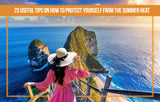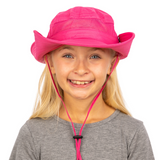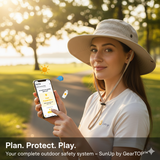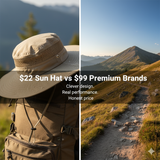
Summer is here, and due to global climate change, you may experience more extreme heat than in previous years. While the sun brings along plenty of benefits, it comes with dangerous consequences when we expose ourselves to the heat for prolonged periods, without the proper protection. We often forget that while we need to protect our skin from UV Rays, we also need to protect ourselves from the heat of the sun.
As most of us move through our days, getting out of the way of the sun completely is impossible, and not something we want to avoid anyways. That’s why we have compiled some tips to keep yourself protected from the summer heat.
Table of contents:
- The GOOD
- How can I get more Vitamin D?
- Can Exposure to the Sun Affect Your Blood Pressure?
- How can MS (multiple sclerosis) be prevented?
- Is the sun good for mental health?
- The BAD
- What conditions cause hyperthermia?
- Can the sun kill you?
- Why is it called heat stroke?
- What is a sun burn?
- How dangerous is skin cancer?
- 23 Tips - How To Protect Yourself From the Heat Of the Sun During Summer
- Conclusion
The GOOD
The sun isn’t all bad…it’s important to know its many sunny benefits...
Main source of vitamin D

Vitamin D, also referred to as “sunshine vitamin,” is taken from the sun. The sun produces vitamin D from the cholesterol in the skin. When the UVB rays hit the skin, vitamin D synthesis takes place.
There are many benefits of vitamin D in the body, such as making your gut cells absorb calcium and phosphorus, which will help you maintain strong and healthy bones.
What happens if you have vitamin D deficiency? When you lack vitamin D, it could cause several health conditions, such as weakness in muscles, and pain in bones. It could also lead to cancer, depression, and in extreme circumstances, even death.
Aside from the sun, you can get vitamin D from foods, such as beef liver, cheese, fatty fish, mushrooms, and egg yolks.
Sunshine may lower your blood pressure
A research done at the Universities of Southampton and Edinburgh shows that sunlight has a positive impact on blood pressure. This is because sunlight can alter levels of the nitric oxide (NO) in the skin and blood.
According to Martin Feelische, professor of Experimental Medicine and Integrative Biology at the University of Southhampton, “NO along with its breakdown products, known to be abundant in the skin is involved in the regulation of blood pressure. When exposed to sunlight, small amounts of NO are transferred from the skin to the circulation, lowering blood vessel tone; as blood pressure drops, so does the risk of heart attack and stroke.”
Lowers sclerosis risk
The cause of multiple sclerosis is still unknown, but there have been studies that show that sunlight may reduce the risk of sclerosis. A Harvard study explores the sun exposure over the life of people with sclerosis. It showed that people who lived in areas with high UVB have lower chances of sclerosis.
Sunlight and mental health
The sun’s rays, as mentioned, aren’t all that bad. In fact, the sun can lift your mood. Here’s how it works—sunlight releases the hormone serotonin in the brain, which is associated with boosting the mood and helping a person feel more calm and focused; hence, getting some sun in the morning is highly recommended!
When you don’t have enough sun exposure, your serotonin levels can dip and when it does, you increase your chances of major depression with seasonal patterns, which is triggered by the changing seasons.
The BAD

Rising temperatures put people at risk of heat-related illnesses, which include heat exhaustion and deadly heatstroke. Here’s what to watch out for when exposed to too much sun and high temperatures.
Hyperthermia
Heatstroke is the most severe form of hyperthermia, which happens when the body is unable to regulate its internal temperature and it can damage the brain and other organs. Heatstroke includes symptoms, such as muscle cramps, dizziness, fatigue, nausea, vomiting, and weakness. You may also notice a spike in heart rate and red skin.
Another form of hyperthermia is heat exhaustion, which is less severe. Along with the symptoms of heatstroke, heat exhaustion includes profuse sweating.
How heat can kill so quickly
Extreme heat is the culprit behind hundreds of deaths every year , and aside from killing humans and animals, heat also destroys the environment.
The elderly, people with chronic illness, outdoor workers, athletes, and individuals who live in socioeconomic disadvantage are more at risk of dying from heat. However, heat can affect anyone at any age.
Our core body temperature is around 37 degrees celsius and it rises or falls due to physiological mechanisms and if you’re in good health, the body can easily cope with deviations of about 3.5 degrees celsius, but beyond that, the body may already show signs of distress.
When it’s hot outside, the body can maintain its core temperature by losing heat in many ways, such as sweating. You can also reduce your heat production by resting because 8% of our energy produced by working muscles is heating, which means that any activity may increase the heat the body needs to lose.
So, what happens when you’re under too much heat? This is when your body can’t lose the heat and you develop heat stress, such as heat cramps or heat exhaustion. However, if the core temperature reaches above 40.5-degree celsius, it could lead to heatstroke, and this is where things become fatal.
Heatstroke
When you’re exposed to extreme heat, the higher chances of getting heatstroke, which is fatal. It can kill or cause damage to the brain and other internal organs.
Heatstroke usually occurs as a progression from less severe heat-related illnesses, but it can still hit you even if you don’t have any previous signs of heat injury. This condition usually occurs in combination with dehydration. When the body lacks water, the body will fail to control its temperature.
The body temperature of a person suffering from heat stroke is over 40 degrees celsius, but usually, its first sign is fainting. It can be accompanied by other symptoms, such as throbbing headache, lack of sweating, dizziness, lightheadedness, rapid heartbeat, rapid and shallow breathing, confusion, disorientation, staggering, and seizures.
Sunburn
Sunburn is another heat-related injury that can cause pain and discomfort. Severe sunburn may also lead to other more severe health conditions, such as cancer. Red, and sometimes swollen, and painful skin is due to overexposure to UV rays from the sun. It can vary from mild to severe.
The symptoms of sunburn vary from one person to another. In some cases, skin redness may not be apparent for several hours after the burn has begun and will reach its peak within 12-24 hours. For minor sunburns, slight redness and tenderness are apparent, which will heal in a few days.
However, more serious sunburn may cause the skin to blister and it could cause too much pain that would require medical care. For severe sunburn, it can be accompanied by other symptoms, such as fever, chills, weakness, nausea, and vomiting. It can also bring symptoms of shock, such as low blood pressure, extreme weakness, and fainting.
After exposure to the sun, the skin may turn red within 30 minutes, while for others, it would take two to six hours. The pain comes by the sixth hour and it can last for 48 hours. The peeling and itching may continue for several weeks.
Skin cancer
How does the sun cause skin cancer? When you are exposed under the sun’s heat for a prolonged period, the UV radiation can damage the DNA in the skin cells that cause skin cancer.
If there is severe DNA damage, it can cause the cells to grow out of control. Keep in mind that skin damage does not only happen when you are on vacation or in a hot area. Even when it is cloudy, the sun is strong enough to cause damage to the skin, which is why it is essential to keep your skin protected from the sun at all times.
Before heading out to enjoy the sunshine and heat, it is important to take certain precautions to protect yourself. Staying cool and hydrated are essential for protecting yourself against the dangers of heat.
Water is an essential nutrient that your body needs. Nutrients do not only come in the form of food; water is the most important, and often, most forgotten nutrient. You can last for some time without food, but only days without water.
23 Tips - How to protect yourself from the heat of the sun during summer
1. Drink enough water to prevent thirst

Hot weather can make you feel thirsty more frequently than colder weather. When you feel thirsty, it is your body telling you that it needs more water to cope with the heat. Drinking enough water is essential when you are exposed to heat. This is because the body functions best within a specific temperature range. So when you get too warm, the body will look for ways to cool off. One of the easiest ways to do that is to drink enough water, even when you are not thirsty.
Keep in mind that you sweat more when the temperature is high, so your body looks for ways to replenish the lost fluids in the body due to excessive sweating.
2. Eat summer-friendly fruits
The solution to keeping yourself healthy during the summer and when you live in a hot area is to eat local and summer-friendly fruits. Why? The nutrients of such fruits are at their peak during this season.
Some of the fruits that you can eat are:
- Tomatoes - aside from vitamin C and antioxidants that this fruit contains, it also comes with lycopene, which can help you fight off chronic diseases, such as skin cancer.
- Zucchini - the fiber in this fruit called pectin can help increase heart health and lower your cholesterol.
- Watermelon - when the heat is on, you need as many fluids as you can and you can get that from watermelon. Watermelon has a high water content that will keep you cool and hydrated. The fruit can also help you curb cravings because it will make you feel full.
- Oranges - you lose potassium when you sweat, which means you are more at risk for muscle cramps. Oranges are rich in potassium and will keep muscle cramps away. Oranges also contain 80% water, which will keep you hydrated.
3. Dilute juices
Diluting fruit juices with water due to its sugary content is essential. However, you also need the calories from the juice, especially when you are trying to lose weight. Therefore, making it 50% water and 50% juice is the right formula. That way, it will empty from your stomach quicker and electrolytes and water can quickly reach your heart and organs.
4. Add soup and vegetable juices in your diet

Another way to replace the fluids you lose in your body during summer is to add soup and vegetable juices in your diet. Certain soups and vegetable juices contain salt and potassium that are perfect for replacing lost fluids.
5. Do NOT stay in or leave anyone in closed, parked cars
Closed cars can quickly heat up, which can be very dangerous, even when you crack a window open. Children are especially at risk of getting heatstroke, or dying, when left in parked and closed cars.
6. Do NOT bundle a baby in blankets or heavy clothing
When the weather is hot, avoid bundling infants in blankets or heavy clothing. While they do have thin and sensitive skin, keep in mind that baby sweat glands are not well-developed, which means they do not tolerate heat well. Keep your baby cool during the summer by letting them wear cool and airy clothing, and only wrap them up when the AC is on.
7. Wear lightweight, light-colored clothing made of breathable material, like cotton
Even if adults can tolerate heat better than children, they can still get hot especially during summer. Sticking to breathable clothing will allow the body to not work so hard to keep you cool, which in turn keeps your overall temperature low. Light-colored clothing does not absorb too much heat of the sun compared to dark-colored clothing.
8. Avoid strenuous outdoor activity on hot days
Staying active, regardless of the weather, is vital, but when it is too hot outside, you might want to skip the workout and wait for the weather to cool down. If you must workout, try to do it in a cool area. You can suffer in too much heat when you do strenuous outdoor activities, which can lead to any of the conditions listed in the beginning of this article.
9. If you are outside, take frequent breaks in a cool place

Sometimes, it is unavoidable to be outside under the sun. However, take it easy, and take breaks in a cool place. Make sure to have cold water along with you so you can keep yourself hydrated while you are outdoors.
10. Always bring along insulated water containers
A standard water container can’t keep your water cold for an extended period. That is why it is vital to invest in insulated water containers that can keep your water cool for hours. By doing so, you get to drink cold water, especially when you are exposed to heat. This will help your body cool down quickly.
11. Air-conditioning is the best way to protect against heat-related illness
Keeping your entire body cool and comfortable is essential during the summer and one of the best ways to do so is to stay in areas with air-conditioning. If you do not have air-conditioning at home, you can hit a local cafe, the mall, and other cool areas to stay in if the weather is too hot for you to handle.
12. Use of fans if air conditioning is NOT available
If there is no air-conditioning, you can keep cool with the use of fans. Make sure to open the windows as well to allow air to flow. Air coolers are an excellent option as well. You can use natural bamboo as a curtain to keep your room cool.
13. Know the symptoms of heat exhaustion

It is essential to be mindful of heat exhaustion symptoms especially if you know you would be spending a lot of time outdoors under the heat of the sun. The symptoms of heat exhaustion include profuse sweating, lightheadedness, and muscle cramps.
14. If you suspect heat exhaustion, move to a cooler location
When you know the symptoms of heat exhaustion, it will be easier for you to spot them early on before they get worse. The moment you notice the symptoms, find a cooler location, and apply cool, wet cloths to your body. Do not forget to drink some cool water and let yourself cool down before you start moving again.
15. If you or someone you know vomits or refuses to drink, call 911

Vomiting due to the heat is an indicator that something more serious is going on. Call 911 before things take a turn for the worse. Heat exhaustion, when not addressed right away, could lead to heatstroke.
16. Stay in touch with your loved ones
Stay in touch with people in your family, especially older ones. The health of older people can sometimes be unpredictable and when the weather is too hot, they are the ones who usually get the most strain from. Make sure to check-in with the people you love at least every day to see how they are doing and if you can do something to help them during hot weather.
17. Do NOT drink alcoholic beverages with caffeine
Alcoholic drinks and caffeinated beverages are not ideal when the weather is too hot. See, you are already sweaty and these beverages can speed up your fluid loss, which will make you feel thirstier than ever. If you are out in the sun, keep yourself hydrated with water and fruit juices instead. If you want to drink coffee or any alcoholic beverages, do it in a cool area so your body does not work too hard to regulate your temperature.
18. Use sunscreen

Sunscreens work like magic, especially when you will be out under the sun for hours. Sunscreen will keep your skin protected from the harmful UV rays. In fact, you should wear sunscreen every day, even when it’s not the summer season.
19. Use an umbrella
Aside from putting on sunscreen, you would also benefit from using an umbrella especially when the heat is too much outside. An umbrella will reflect harmful UV rays away from you, which will give you more protection.
20. Use sunglasses that have UV protection for the eyes
Not all sunglasses come with UV protection, so you need to be mindful when buying a pair. Protecting your eyes from the glare of the sun is essential. Too much squinting may lead to the formation of wrinkles, which will make you look older.
21. If you will be staying out for prolonged periods out in the heat of the sun use clothing that has a UPF 30+ rating
There are so many ways to protect yourself from the harmful rays of the sun. One way is to invest in sun protective clothing that has over UPF 30 rating. UPF 30+ qualifies for The Skin Cancer Foundation’s Seal of Recommendation because it offers excellent protection. The UPF rating for clothing begins at 15, which offers good protection. You can also get UPF ratings of 20, 30, 45, 50, and 50+. UPF 50+ offers excellent protection from the sun.
22. Use wide brim hats that have minimum UPF protection of 30+ much recommended with flaps depending on outdoor activity

Hats are trendy and they can definitely make your outfits stand out. During the summer or extreme heat, wide-brim hats are a good choice to ensure that your full face is protected. You also might want to consider getting a hat with flaps to also protect the skin on your ears and your neck.
23. Most natural and God-given gift to most is common sense
Common sense is your most reliable protection against the heat of the sun. Using it during the summer and when you are in hot areas will keep your well-being protected at all times. Common sense will not lead you astray! So, use it well.
Conclusion
The heat of the sun has serious consequences on health. In fact, it could even cause death. Therefore, keeping yourself protected is essential. These tips, such as staying hydrated, eating summer-friendly fruits, diluting your juices, avoiding strenuous activities, etc. will help you stay alive and healthy despite the heat.
If you really have to be out there, you can always protect yourself by wearing sunscreen and sun-protective clothing. Technology has paved the way to bring sun protection in the things that we wear, so take advantage of this, especially if you live in a tropical area. One of the best things that you can use is a wide-brim hat.
There are many wide-brim hats that you can get today, and of course, it is important to get high-quality ones that will not only give you comfort and maximum protection but will also make you look stylish. Check out our collection of wide-brim hats today and get maximum protection and style.






Leave a comment (all fields required)